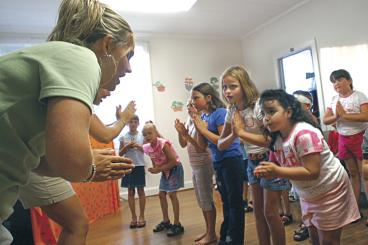Twenty percent of the people do 80 percent of the work.
That’s the old adage that floats around churches. And many say they find it to be true, whether that be because of people’s reluctance to volunteer, or the fact that time-crunched church staff members naturally turn to those they already know to be willing.
But Mike Jackson says there’s a better way.
“When the church or ministry seeks to implement an intentional strategy for discovering and developing potential leaders, I do believe it will help with the issue that is common in most churches that very few people are really involved in the work,” said Jackson, director of the office of leadership and church health for the Alabama Baptist State Board of Missions. “With effective development of potential leaders, continual equipping and training of those leaders and annual affirmation and evaluation, I think we will have better results in producing more leaders who are effective in Kingdom ministry.”
A personal process
Jackson said a good model to follow is to enlist, equip, empower, release to do the work, encourage and evaluate.
And all the way through, the process is personal, he said.
Jackson starts the process of enlisting leaders by using two specific methods — mentoring and potential leader classes.
“I think mentoring is one of the most effective ways to discover good leaders,” he said. “Pouring into the lives of others helps develop the needed skills and allows a mentor to observe the potential in a person for leadership.”
And it moves people in a very natural way into leadership as they grow as followers of Jesus and are encouraged to find ways to mentor others, he said.
Potential leader training classes are another way to recruit and prepare volunteers, Jackson said. These classes “expose the prospect to leadership and give them the chance to put into practice what they have learned in the sessions by doing ‘student teaching.’”
Tressa McQueen, children’s ministry director at Cottage Hill Baptist Church, Mobile, said that’s the theory behind how her ministry recruits volunteers.
“When people show an interest in volunteering, we ask them what they are comfortable with — what ages, what activities, etc.,” she said. “As we get to know them, identifying their strengths and skills, we are able to plug them in to a place that works with their God-given talents and abilities.”
David Loyed, family pastor/education at Whitesburg Baptist Church, Huntsville, said his church leadership uses a placement process called Heart to Serve to plug people in to the places where they fit best.
“Our enlistment entails one-on-one meetings and interviews with the ministry leaders,” he said. This helps them get to know potential leaders and decide what type of ministry works most effectively for their gifting.
Once people are enlisted and placed, equipping is vital, Jackson said. “A willing heart of service can become effective when equipped with the proper training,” he said.
Train and equip
Dawn Stephens, women’s minister at The Church at Brook Hills, Birmingham, said her staff offers basic training then sets potential leaders up with more seasoned leaders to shadow them and learn from them.
“Leaders are the lifeblood of any church and bring their own set of gifts and abilities to the table,” Stephens said.
But, she said, it’s important to provide them with ongoing training and equipping through mentoring, books, blog posts and other resources.
McQueen said her ministry offers group leadership training for all volunteers once or twice a year.
More training opportunities are available at a local and state level, such as events offered by Jackson’s office that can be scheduled at your church free of charge.
Web-based training exists too, like Ministry Grid, a program by LifeWay Christian Resources that Whitesburg Baptist uses as its long-term plan to equip and grow leaders.
Ministry Grid, found at www.ministrygrid.com, “allows them to train any time and any place and get better as a leader,” Loyed said.
Evaluate
And Jackson said ongoing evaluation is important.
“Reviewing with them annually their responsibilities and the expectations will encourage effectiveness and assure fruitfulness and fulfillment to the task,” he said.
Jackson said he would make sure volunteers understand from the beginning that ongoing training will be expected as they continue on as leaders in the church.
“Most vocations require continuing education for those who serve and the church should have as high if not higher standards for our leaders and volunteers,” he said.






Share with others: